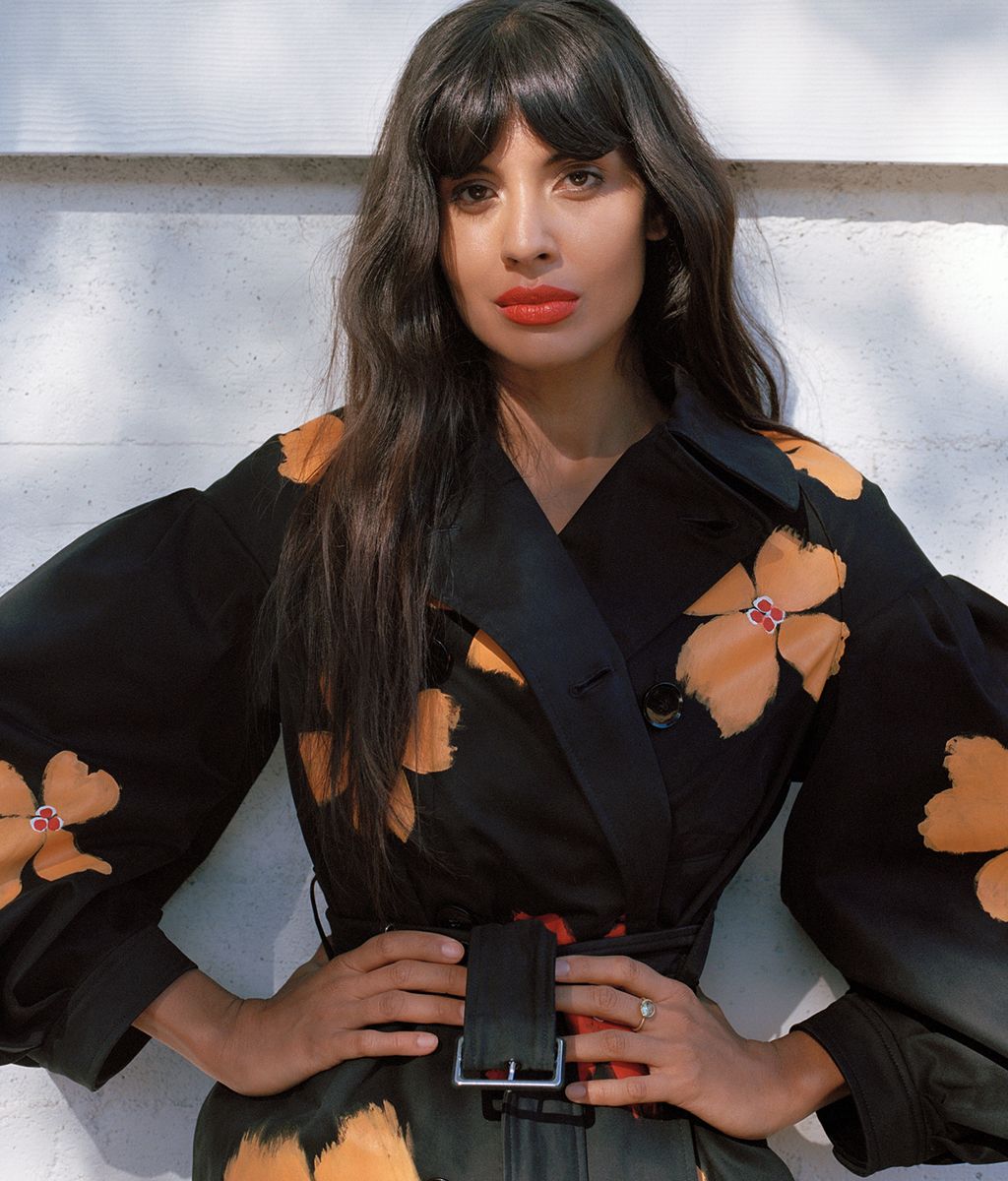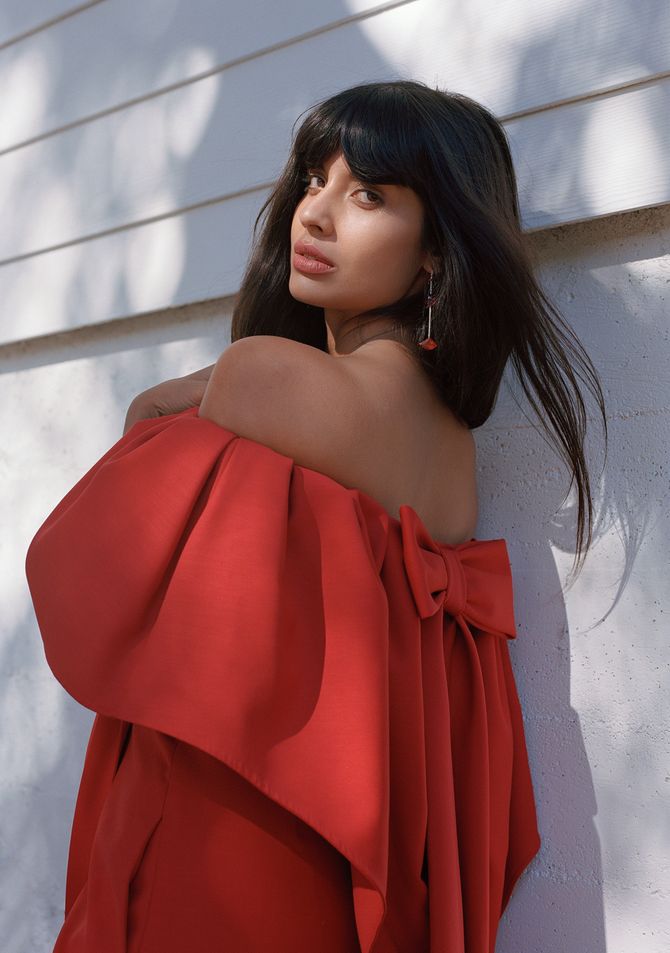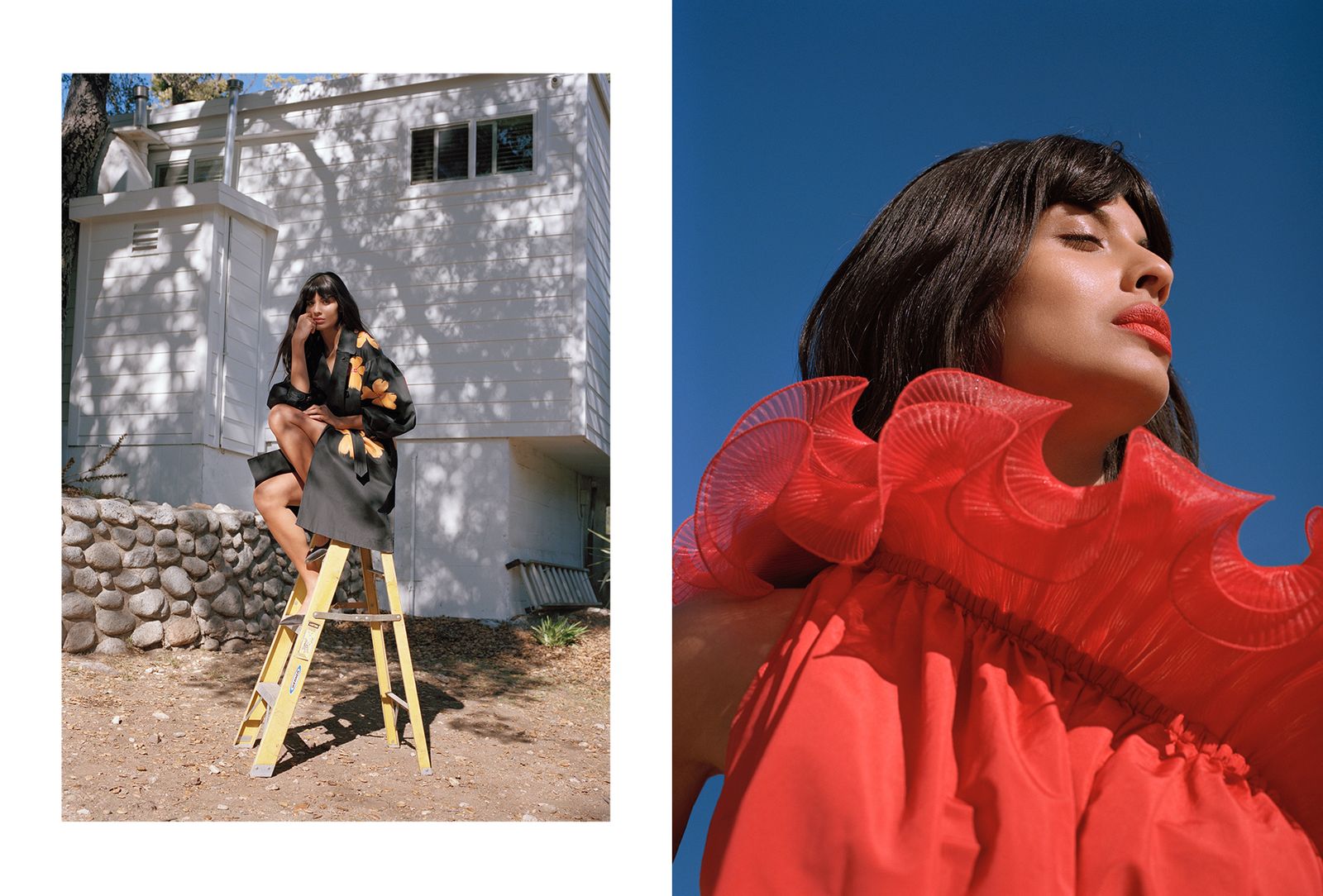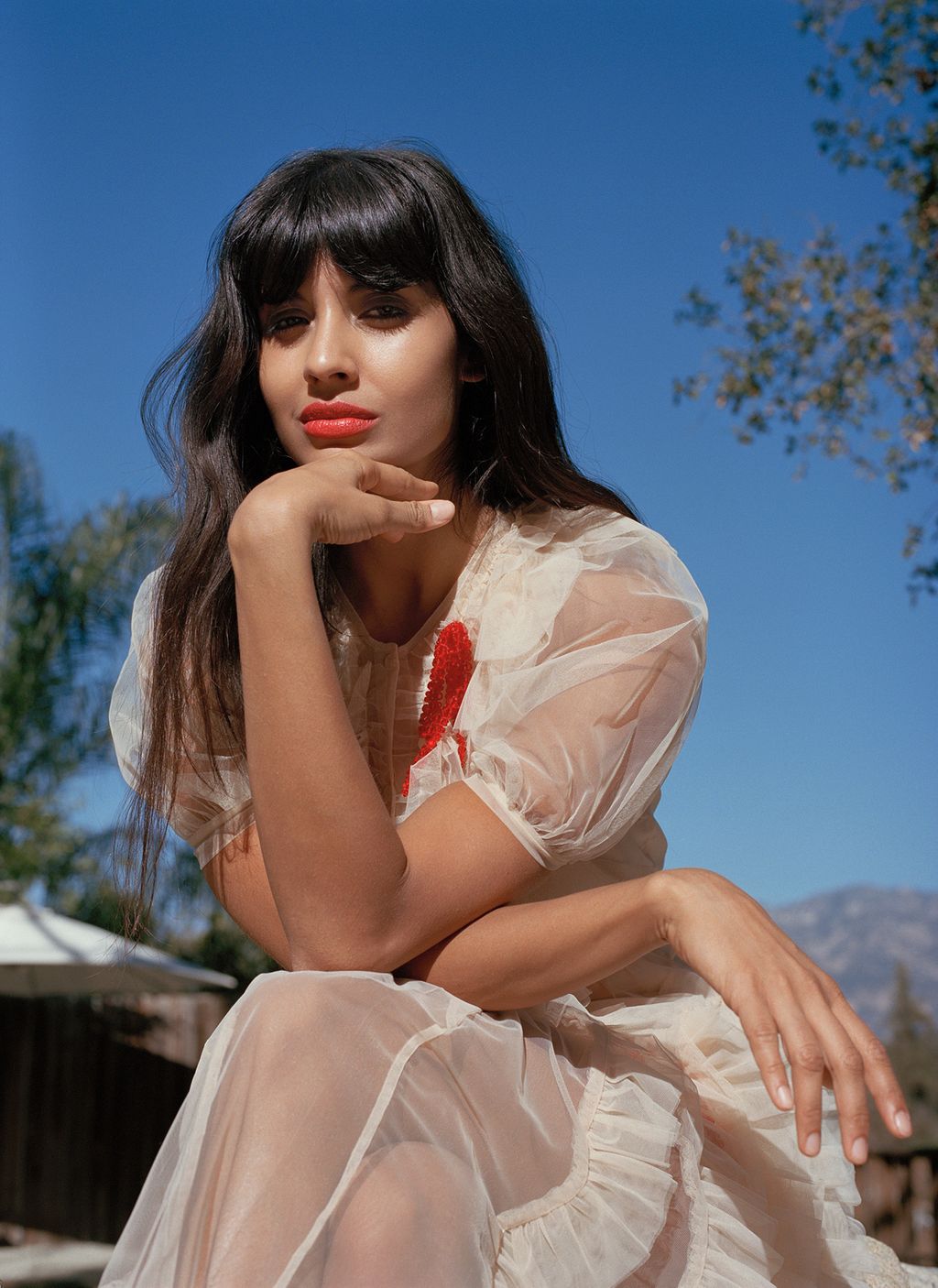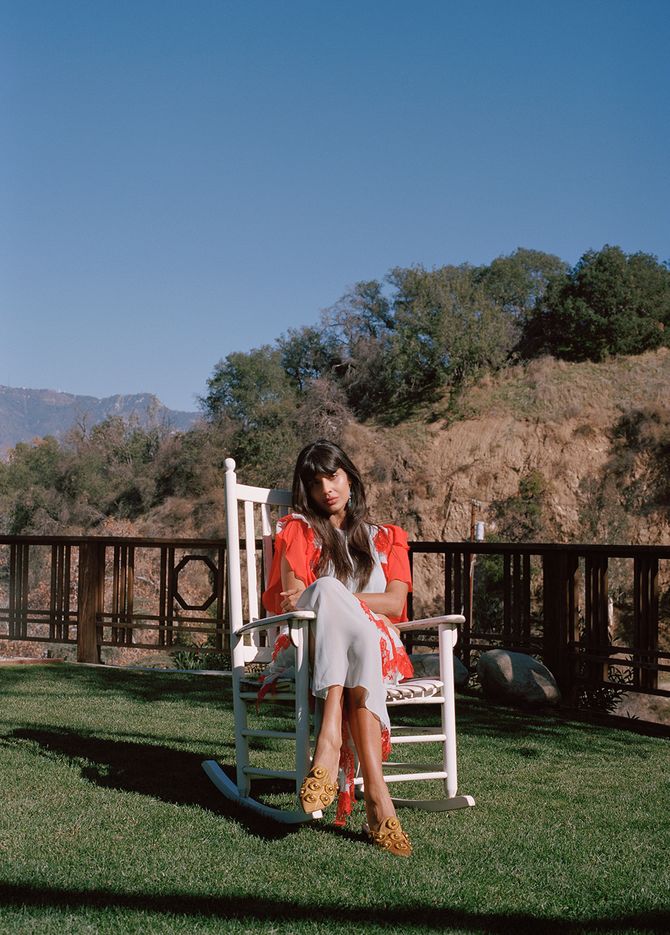Jameela Jamil can’t wait to get her shoes off. The minute we sit down in the spacious tea room of West Hollywood’s London Hotel, the five-eleven Good Place star kicks away her beige espadrilles and breathes a sigh of relief. “Do not look at how dirty my feet are,” she warns. The tea room at an upscale hotel — with long white couches and marble tabletops and $48 tea service — is not the kind of establishment where most people would choose to go barefoot, but when you look like Jameela Jamil and are starring in TV’s most beloved new sitcom, you can do pretty much whatever you want. “Please, spread out! Make yourself comfortable,” encourages our server, LeRoy, who has come over to read us the world’s most elaborate hot-beverage menu.
“Oh, you shouldn’t say that, I will be fully naked when you come back,” says Jamil, before bypassing the many complex menu options (including a “bespoke blend made for a Battle of Britain WW2 navigator” and something “scented over six consecutive nights with fresh jasmine flowers”) to order a pot of English peppermint. “Can I just have loads of that, please?” She raises an eyebrow and looks at me. “You should have just taken me to McDonald’s.”
With her long string of food allergies and intolerances, Jamil probably wouldn’t have done well at McD’s — but since this is a boutique hotel in the Dietary Modification Capital of America, she’s able to procure a plate of gluten- and dairy-free finger-sandwiches. “My fear of having gas in front of Kristen Bell is my overriding fear of the entire series,” Jamil confessed on our Uber ride over. “Seriously, there’s something wrong with the food in this country. I now avoid food on set because otherwise it’s just like I’m a walking grenade.”
Jamil seems to delight in surprising people with this sort of dissonance — with, for example, looking like a Victoria’s Secret model and cursing like a young Michael Caine. “As soon as you meet me I have such an un-sexy personality. No matter what I might look like or dress like, as soon as I open my mouth I can kill any erection. That’s my superpower,” she insists, unconvincingly. She has an up-for-anything gameness that speaks to her years as a live-TV host: While Jamil seems to have dropped into Hollywood out of nowhere, she’s a well-known face in England, where she hosted Channel 4’s teen show T4 and BBC Radio 1’s chart show, and worked for years as a presenter, journalist, cultural commenter, radio DJ, fashion-plate, and general broadcaster-about-town. At the age of 29, despite everyone’s advice to the contrary, she decided to give up her life in London and move to L.A. for a fresh start, where she planned to work on her writing and DJ-ing. Instead, she took an audition for a new Mike Schur sitcom, and nabbed her first-ever acting gig. On The Good Place she plays Tahani al-Jamil, a narcissistic, self-obsessed British philanthropist-socialite, prone to world-historical name-drops, such as: “I am an expert at mediating conflict. Like when my friends Scary, Sporty, Posh, and Baby had an issue with my other friend, Archbishop Desmond Tutu.”
Yet while Jamil gives off a distinctly posh air, she wants to make one thing clear: She is nothing like her character. According to Jamil, she and Tahani have just two things in common. They do not wear their hair up (because “I’m not a factory worker” —Tahani), and they do not wear jeans (because “you have to be really cool to look cool in jeans, like J.Lo” —Jameela). While Tahani’s rich-girl good looks are a constant punch line on the show, Jamil seems amused to be playing a character whose stereotypical sexiness doesn’t align with the self-image she honed earlier in life. “I’ve gained 75 pounds twice in my life. Four years ago I was 75 pounds heavier,” she explains, whipping out her iPhone and typing “Jameela Jamil Fat” into Google. “I have to Google what the Daily Mail would have written. Oh here it is,” she says, handing me her phone. “I gained a Spice Girl. I’m basically Christian Bale without any Academy Awards. I basically ate all my friends and family, that’s why I had to move to America.”
Jamil’s whole deal — the self-deprecating potty-mouth beauty who talks liberally about farting and sex — has shades of the J.Law–style Cool Girl model of Hollywood relatability. But for Jamil, it seems less like an effort to appear down-to-earth than a well-worn suit of armor, one forged long before she could expect to be cast as the “hot girl” on TV. “I think it’s better to establish yourself early, especially as a woman, as someone who has an opinion, because I think they’re less likely to fuck with you if you’re the kind of person who blurts things out. In England I was kind of a live wire, so people knew not to fuck with me,” Jamil explains, popping a rectangular egg sandwich into her mouth. That, and her life hasn’t always been sunshine and roses and $48 tea sets. “I had no idea that I would ever be this calm and happy. Definitely didn’t think I would find that in Hollywood of all places, the least calm place ever.”
Jamil grew up poor and moved constantly between different houses across London, with brief stints living in Pakistan and Spain. Her parents — an Indian father and a Pakistani mother — had a troubled marriage, and unhappiness at home was compounded by the torment she faced at school. One of the only students of color at the fancy all-girls school she attended on scholarship, Jamil remembers being bullied mercilessly. “It was sort of open season on Pakistani people and Indian people back then. And it really traumatized me,” says Jamil, who describes herself as a painfully shy, chubby, and socially awkward child. “For a lot of my life, I’ve been really scared of girls because of that school. Girls know how to snip out the weak and I was super vulnerable. I was so lonely. I didn’t have any friends until I was 19. No one kissed me until I was 21.”
When Jamil was 17, she got hit by a car while running across the road to get away from a bee. She seriously injured her back and was confined to bed rest for a year, forcing her to drop out of school. While flat on her back, she devoured American sitcoms, which provided comfort and solace in a time when there was otherwise little to laugh about. “Frasier, Friends, Cheers, you name it,” she says. “I had such a big crush on Ted [Danson], so it’s really weird to work with him now. I developed my personality from those shows. I’m Ross and Chandler if they had a baby and made me.” She supplemented that with a steady diet of English comedies — Peter O’Toole, Monty Python, Rowan Atkinson — relishing the darker side of British humor. “You use comedy as a way to hide your pain in England,” she says. “And frustration. And there is a lot of pain and frustration in England sometimes because you’re repressed, you’re crammed in on top of each other, especially in London. I think it encourages a bolder, more constant sense of humor and sarcasm.”
After Jamil recovered from her spinal injury, she developed a new grab-life-by-the-balls attitude. Initially, she took a job teaching English as a foreign language, which is how she learned to speak in front of people. She landed her TV-presenting gig, hosting a music show on England’s Channel 4, after meeting a producer in a pub. “I came around at the right time,” she says. “They were looking for strong women and diversity. Ten years before that, I don’t know if I would ever have had a career.”
Over its first two seasons, The Good Place, an afterlife comedy starring Ted Danson and Kristen Bell, has established itself as an all-time-great network sitcom. Like creator Mike Schur’s previous outing Parks and Recreation, it’s a confection of whip-smart one-liners and visual gags with a fundamentally optimistic worldview. And it’s also one of the most unexpectedly cerebral shows on TV, nonchalantly name-dropping Kant and Kierkegaard in the same breath as Blue Ivy and North West.
“So many networks just sort of dumb everything down, water everything down. I think that’s crap. If you see society as rubbish, then society will become rubbish,” says Jamil, who describes the set as a positively utopian work environment. “You know how bad kids are a sign of bad parents? Mike Schur is our dad. And he’s a great dad. And because of that, we’re good kids,” says Jamil, before generously offering me up a catchy quote — a helpful holdover from her journalism days. “It’s like working for Lady Diana. Mike Schur is the American Lady Diana. There you go.” Of course, this wouldn’t be a Good Place cast interview without a Ted Danson anecdote, and Jamil is happy to oblige. “He filmed the finale with fucking pneumonia. He was hospitalized afterwards. No one had any idea. We were like he’s being really quiet, but we thought he was just getting into character. Ted being quiet and not dancing or pretending to fart on you on set is the most he’ll throw his weight around.”
Jamil discusses the show with genuine exuberance. “People make fun of how much of a fan I am of the show in real life,” she says. “It’s sad because I have no cool whatsoever. I’m distinctly lacking in chill.” In particular, Jamil is thrilled to be on a show that has a diverse lead cast, while refusing to cast actors of color as tokens or tropes or stereotypes. “The amount of kids we get telling me and Manny and Will how cool it is to see themselves represented on TV is really brilliant and also sour-feeling because you’re like, god, why is it taking this long? The internet didn’t break. The television didn’t break. People didn’t stop watching because there were normal people on set.”
After three rough decades — a “bad” childhood, “worse” teens, and “abysmal” 20s — Jamil says she is truly happy for the first time in her life. Moving to L.A., the land of sunshine and gluten-free tea cakes, has done wonders for her. Partly her newfound contentment was the result of a successful bout of EMDR therapy (which is a psychotherapy treatment mainly used to help people process trauma, “not like some ramma ramma ding fuck therapy,” she explains helpfully); partly, the passage of time. “I don’t really get ageism. I love being in my 30s. I’m just so into it. The older I get the more I understand and the less I feel worried about speaking up for myself, because I’m like, I’m a goddamn grown woman. It feels wonderful,” she says. “I’m not scared. I’m not difficult to work with, but I’m definitely opinionated. If you don’t ask, no one is just going to give you anything in this world, especially not as a woman, especially not as a brown woman.” Now, she says: “I’ve gotten everything off my chest.”
As we finish up, LeRoy comes out with a plate of gluten-rich desserts, which Jamil can’t eat — she packs them up in a box to take home for her boyfriend, with whom she shares a bungalow in the Hollywood hills. (He’s a successful British musician; they’ve been together for about three years, and unfortunately I can’t tell you who he is.) “Nepotism is a dirty word for us,” she says. “I really don’t want to be known as someone’s girlfriend. If I’m going to do this, I’m going to do this alone.” Before Jamil got sidelined with a successful acting career, she had planned to move to L.A. to become a comedy writer, and she says she’s busy working on her own material, using what she has learned from the likes of Schur to hone her own comic sensibility. “I don’t find a lot of material stimulating for girls yet. So I’m writing my own material now in the hopes that maybe I can write something for women to be in,” she tells me. “It’s black comedy, I guess they would say. Is that what it’s called? Dark comedy? Dark humor? Comedy noir?” As for what happens next, Jamil hasn’t the foggiest idea — which is fine by her.
“I was an English teacher who accidentally became a host, who then became a column writer even though I didn’t have any bloody A-levels, and then I became a radio DJ on BBC Radio 1 having no idea what the hell I was doing,” she tells me. “Then I came here, having never acted in my life, and now I’m acting opposite Ted Danson with a seven-year deal. I don’t know what the fuck I’m doing. Maybe I’ll bring out a rap album; I don’t know. Or become a professional tango dancer,” she says. “I have no trajectory. If I had a trajectory I probably would never have been able to do all the fun things I’ve done.”
Jamil’s brand of high-volume candor can be a lot to absorb, but it’s a force she tries to marshal deliberately. On her blog and in the British press, Jamil often posts her opinions on controversial topics, and has spoken out on issues from disability rights to size-shaming. “It’s insane and criminal to have a platform and not use it for good,” she says. “I think it’s really deeply irresponsible just to use your platform to plug products, like, Look at this razor that I bought. It’s like, Shut up! Talk about what’s going on in the world. You don’t get to just get all the money and the nice shit and the $48 tea and then not have any responsibilities,” she says. “If you call yourself an influencer on Instagram, you’re going straight to the Bad Place. How dare you. How dare you. What are you even influencing? Drink this weight-loss tea. Fuck off.”
Last month, Jamil wrote a widely shared blog post about the need for “enthusiastic consent” in the wake of the Aziz Ansari fiasco, a move that seems especially noteworthy when you learn that the two share the same management company. The piece doesn’t toe any generationally approved feminist party line — she blames porn and music videos, in parts, for the objectification of women in our culture — but it’s something Jamil has thought a lot about. “I’ve been assaulted in many different ways in my life as a woman, and often not even realized the gravity of what had happened to me,” she tells me. “I feel very passionately about girls being armed with an understanding of our power. I think when I was telling girls to take responsibility for themselves, and learn that they have the right to say no, I was never in any way victim-shaming. I’m saying, I think it’s actually much more dangerous to think that we don’t have any power, and that we’re not responsible for ourselves. I think that’s far more destructive to feel that way. We are women. We are strong. We make people. We feed those people with our own bodies.”
Her new chapter in Hollywood has given her a front-row seat to the industry’s efforts to grapple with #MeToo. And so far, she’s remarkably optimistic about what she’s seen. “I feel so safe in rooms all the time now. I feel like I can go to meetings without a GoPro on,” she says emphatically. “The perviness has been dialed all the way down to zero and men are afraid, which, I’m sure isn’t a great, sustainable tension to have in every room, but once men become conditioned to never, ever make a woman feel threatened or objectified in any way, I think everything will calm down and we’ll learn how to get along like people,” she says. “Women are scared of a jog in the park. We’re scared walking down the street at night. We’re scared in any basement ever, and of elevators, we’re scared walking to our car, we’re scared in a room full of men when we’re outnumbered. We’re afraid in our own houses, in case a man breaks into our house and attacks us in our bed. There’s literally nowhere that we feel completely safe other than a fucking convent. So like, you know, I’m sorry that men feel a bit afraid for now, but like, we’ve been afraid for our safety from the beginning of time.” In conclusion, if there are messy reckonings this year — as with Ansari — that’s just how it has to be. “If this is the equivalent of our Bloody Sunday, so be it,” she declares.
While Jamil wants to be clear to avoid victim-blaming, she believes that her confident attitude and tough-talking exterior have served her well when it comes to avoiding entertainment-industry predators. “I came out the gate like, I don’t care about this industry. I’ll happily go and clear out bins tomorrow,” she says. (Well, as long as she doesn’t have to have her hair up or wear jeans.) “It’s not that I don’t love what I do, but honestly nothing other than love, mental health, and the happiness of the people around you matters. I think because I believe that, I’ve been a bit of a psycho throughout my career. There’s something scary about a loose cannon. People know that you’re constantly mouthing off all the time in interviews and that you don’t have anything to lose,” she concludes, slipping her shoes back on and tossing her hair over her shoulder as she rises. “People with nothing to lose are the most dangerous people in the world.”
